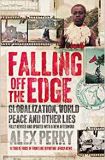Falling Off The Edge: Globalization, World Peace and Other Lies by Alex Perry
| Falling Off The Edge: Globalization, World Peace and Other Lies by Alex Perry | |
|
| |
| Category: Politics and Society | |
| Reviewer: George Care | |
| Summary: A collection of Time journalist's pieces from all over the World linked to the deprivation which is the underside of globalisation. It's unfortunate that the book only covers events up to 2007. | |
| Buy? Yes | Borrow? Yes |
| Pages: 356 | Date: January 2009 |
| Publisher: Macmillan | |
| ISBN: 978-0230706880 | |
|
| |
From Russia to a devastated sub-Saharan Africa, economic collapse and consequent protest in reaction threaten the established order. Globalisation, is putting the survival of populations in the world's poorest countries at risk.
Perry is good at outlining, succinctly, the geopolitical background. The city of Bombay was so named when the Portuguese took possession of seven islands off the West Coast of India in 1534. It was actually named BomBaia which means Good Bay. It grew over five centuries by migration, which made it into a large commercial centre and is now growing at the rate of 500 people every day as the so-called economic miracle of India develops.
However, Perry shows how the devastating flood of August 2005 brought the entire population of the super-sized city to its knees. Foreign businessmen asked the questions to try to explain how the industrial superstructure of such a large economy could collapse after just one day of heavy rain. Why did the drains not function? Where were the police? Was there a disaster management plan? Conditions in the countryside seem much worse again, with the horrific resurgence of Tantric sorcery and female infanticide both linked to the growth in consumerism.
As in China's sweatshop city of Shenzhen, described by Perry in disturbing, disconcerting but magnificent detail, ferociously ambitious and rich gangsters in India drain profits from the poor. Bombay (Mombai) attracts indigent migrants in such numbers that the majority of people live in cities. The UN expects that by 2015 Bombay will be the world's largest city of 22.6 million; many think this an underestimate!.
One argument that Perry continuously develops is that the system does not make the rich at all accountable to or for the growing numbers of poor. In India it is because of the weakness of political process; in China it is an authoritarian system, which suppresses unions and controls civil society. Since Perry has written this book, Mombai attacks have erupted and, of course, the pressures for social and political freedom in China grow daily. Frustrations, especially in the current financial crisis, may well be expressed in increasing xenophobia. This means escalating tension between China and the USA.
In the steely prose of a post-modern Hemmingway, Perry outlines the appalling situation in Nepal. The Maoist guerrilla armies in Katmandu constitute what he describes as a New Left revolution. This is also to be found spreading throughout India through the action of the rebel Naxals. The World Bank is concerned about the effect of such violent conflict resulting in decades of reduced growth. The feeling is established that this intrepid journalist has looked the whole terrible situation directly in the eye. Here is the Africa Bureau Chief for Time magazine tells the story. Corporate greed is responsible for such effects of globalisation.
This is a most useful book for outlining specific problems such as the exemplary chapter on resources of Oil and Water in Africa. Perry explains the frustration of Nigerian rebel Jomo Gombo; known in Africa as Henry Okah. He leads the MEND rebellion, which is fighting on behalf of tribesmen in the Delta against poverty in the face of huge profits taken by Nigerian leaders and for fair redistribution of the wealth produced from the importance of African oil to corporations, mostly in the US. (Africans have become poorer since the oil was tapped). Perry goes on to explain why the US Navy patrols this coast and that the tension behind these injustices extends to other countries located nearby including Equatorial Guinea and Angola.
There is also a clear explanation of the competition over water on the Chad/Sudan border - related to the crisis in Darfur - and in a short but clear exposition explains the intense ecological pressures that are occasioned by the rapid pace of global trade. There is a similar predicament in Northern Kenya and no doubt such areas will be occupying the attention of newly inducted President Barack Obama.
Twenty pages of end notes provide a rich resource for people seeking references or websites on particular issues and sixteen pages of colour plates add a photographic vibrancy to the issues discussed. Turning to the final summary, the reader may be a little disappointed to see that some of the information is a year out of date. Quite a lot has happened in that particular year. 2008 was a very long time in World politics.
After discussing the dangerous conflicts which the system engenders, there is an unsatisfactory summary that touches on the author's view of Evolution and reference is made to a meeting the author had with the Dalai Lama. The on-the-pulse journalistic reporting in this book is stronger than thorough analysis.
The essential point, which is indicated earlier in this book, is that a global underclass in Africa and central Asia of about a billion people are stuck in progressively more cruel conditions. Global capitalism is the problem; justice, concern and compassion is the solution.
I'd like to thank the publishers for sending a copy to The Bookbag.
Further reading suggestions: Aid and Other Dirty Business: How Good Intentions Have Failed the World's Poor by Giles Bolton and The Corporation: The Pathological Pursuit of Profit and Power by Joel Bakan
Please share on: ![]() Facebook,
Facebook, ![]() Twitter and
Twitter and
![]() Instagram
Instagram
![]() You can read more book reviews or buy Falling Off The Edge: Globalization, World Peace and Other Lies by Alex Perry at Amazon.co.uk Amazon currently charges £2.99 for standard delivery for orders under £20, over which delivery is free.
You can read more book reviews or buy Falling Off The Edge: Globalization, World Peace and Other Lies by Alex Perry at Amazon.co.uk Amazon currently charges £2.99 for standard delivery for orders under £20, over which delivery is free.
![]() You can read more book reviews or buy Falling Off The Edge: Globalization, World Peace and Other Lies by Alex Perry at Amazon.com.
You can read more book reviews or buy Falling Off The Edge: Globalization, World Peace and Other Lies by Alex Perry at Amazon.com.
Comments
Like to comment on this review?
Just send us an email and we'll put the best up on the site.


